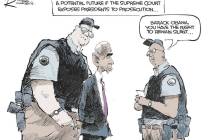‘Prolonged’ crisis
Congressional passage Friday of a $700 billion bailout for the financial sector has yet to impress Wall Street.
The Dow at one point Monday plunged nearly 800 points, falling below the 10,000 mark for the first time in four years. By the end of trading, however, the market had rebounded somewhat, recording a final drop of a "mere" 370 points to 9,955.
Other domestic indexes also slumped, most around 5 percent.
The Bush administration and Congress clearly felt that the rushed "rescue" package would help stabilize the markets. It hasn't happened.
"The fact is, people are scared and the only thing they're doing is selling," Ryan Detrick, senior technical strategist at Schaeffer's Investment Research, told The Associated Press. "Investors are cleaning out portfolios and getting rid of everything because nothing seems to be working."
Nor is the crisis confined to the United States. Governments of Germany, Ireland and Greece stepped in to quell concern by announcing they would guarantee bank deposits as overseas markets fell from 8 to 15 percent.
Coupled with the bleak employment figures released last week, the Dow's wild fluctuations highlight that "Investors are becoming more convinced that the country is leading a prolonged economic crisis that is spreading to other nations," according to AP analysts.
In other words, despite the expectations raised by the Washington "rescue" package, this isn't a downturn that will run its course in a quarter or two.
In Nevada, local governments and the state will continue to suffer revenue shortfalls for the foreseeable future. If the current malaise has any long-term positive outcome, perhaps it will be to educate the political class about the need for caution and prudence during the good times, so as to soften the blow when the well inevitably goes dry.























